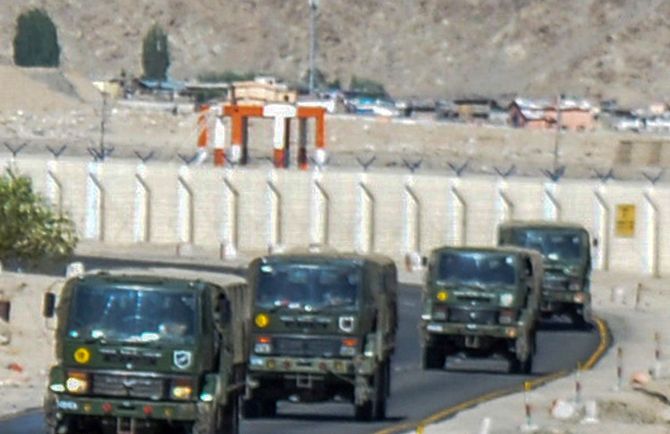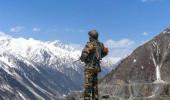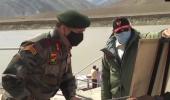China's People's Liberation Army on Thursday completed withdrawal of its troops from two more face-off sites in Gogra and Hot Springs in eastern Ladakh in line with a mutually agreed disengagement process with India even as the two countries are set to hold a fresh round of diplomatic talks on Friday to further de-escalate the situation.

As the first phase of the disengagement neared completion, external affairs ministry spokesperson Anurag Srivastava, at a media briefing, once again rejected China's claim over Galwan Valley, but reiterated that India remained convinced of the need for maintenance of peace and tranquility in the border areas and resolution of differences through dialogue.
At the same time, he asserted that India is committed to ensuring its sovereignty and territorial integrity and that the Line of Actual Control must be strictly respected and observed, saying it is the basis for peace and tranquility in border areas.
Government sources said the two sides are also expected to hold a fourth round of Corps commander level dialogue by early next week to finalise modalities for de-induction of troops by both sides at their rear bases in the high-altitude region.
Both sides have completed creation of a buffer zone of three kilometres in the three friction points of Galwan Valley, Gogra and Hot Springs as part of a temporary measure, the sources said, adding there has been a thinning out of troops from Finger 4 area in Pangong Tso as well.
China has already pulled back troops from the friction points in Galwan Valley.
The disengagement of troops from the friction points formally kicked off on Monday following a eight-week eyeball-to-eyeball confrontation between the two armies at multiple locations in eastern Ladakh.
In the meantime, people familiar with the development said the two sides will hold another round of online meeting on Friday on the border row under the framework of Working Mechanism for Consultation and Coordination on India-China border affairs.
Naveen Srivastava, Joint Secretary (East Asia) in the external affairs ministry, will hold talks with Wu Jianghao, Director General in the Chinese foreign ministry.
At his briefing, the MEA spokesperson said National Security Advisor Ajit Doval categorically conveyed to Chinese Foreign Minister Wang Yi on Sunday about India's position on the recent developments along the LAC including in the Galwan Valley area.
Doval and Wang, the Special Representatives for border talks, held a telephonic conversation on Sunday following which armies of the two countries began disengagement of troops from friction points in eastern Ladakh.
"The NSA emphasised in this context that the Indian troops had always taken a very responsible approach towards border management and at the same time, our forces were deeply committed to ensuring India's sovereignty and security," Srivastava said.
Srivastava said Doval and Wang agreed that peace and tranquility in border areas were essential for the overall development of bilateral relations.
He also reiterated that the recent Chinese claims to the Galwan Valley area are "exaggerated and untenable".
"We remain convinced of the need for maintenance of peace and tranquility in the border areas and the resolution of differences through dialogue, at the same time, we are also strongly committed to ensuring India's sovereignty and territorial integrity," he said.
Galwan Valley was the site of violent clashes between Indian and Chinese armies on June 15 in which 20 Indian soldiers were killed.
The Chinese side also suffered casualties but it is yet to give out the details. According to an American intelligence report, the number of casualties on the Chinese side was 35.
Srivastava also said the diplomatic and military officials of both sides will continue their meetings to take forward the process of disengagement and de-escalation as agreed to by the Special Representatives.
"The next meeting of the Working Mechanism for Consultation and Coordination on India-China border affairs is expected to take place soon," he said.
The Chinese military on Thursday completed moving back its troops from the face-off sites in Gogra and Hot Springs in eastern Ladakh in line with the understanding reached with the Indian Army, government sources said.
The Indian and Chinese armies are locked in the bitter standoff in multiple locations in eastern Ladakh for the last eight weeks. The tension escalated manifold after the Galwan Valley clashes.
China, meanwhile, said Chinese and Indian troops have taken "effective measures" to disengage at the Galwan Valley and other areas along the LAC in eastern Ladakh and the situation is "stable and improving,"
Chinese foreign ministry spokesman Zhao Lijian told a media briefing in Beijing that “following the consensus reached at the commander-level talks, China, India border troops have taken effective measures to disengage at the front-line at the Galwan Valley and other areas.”
“The situation along the border is stable and improving,” he said.












 © 2025
© 2025